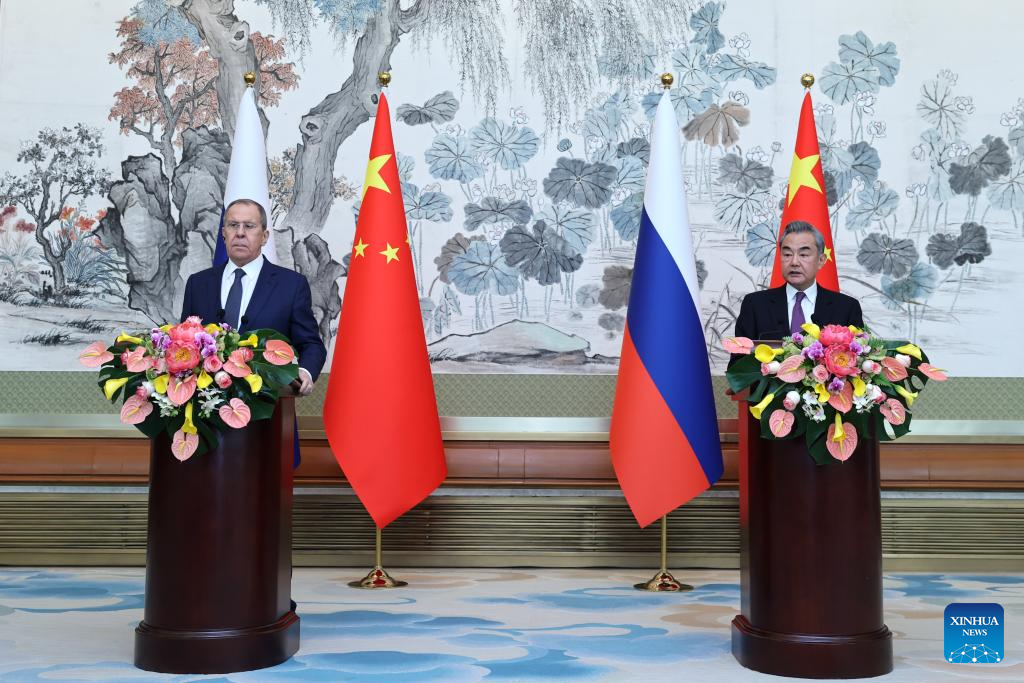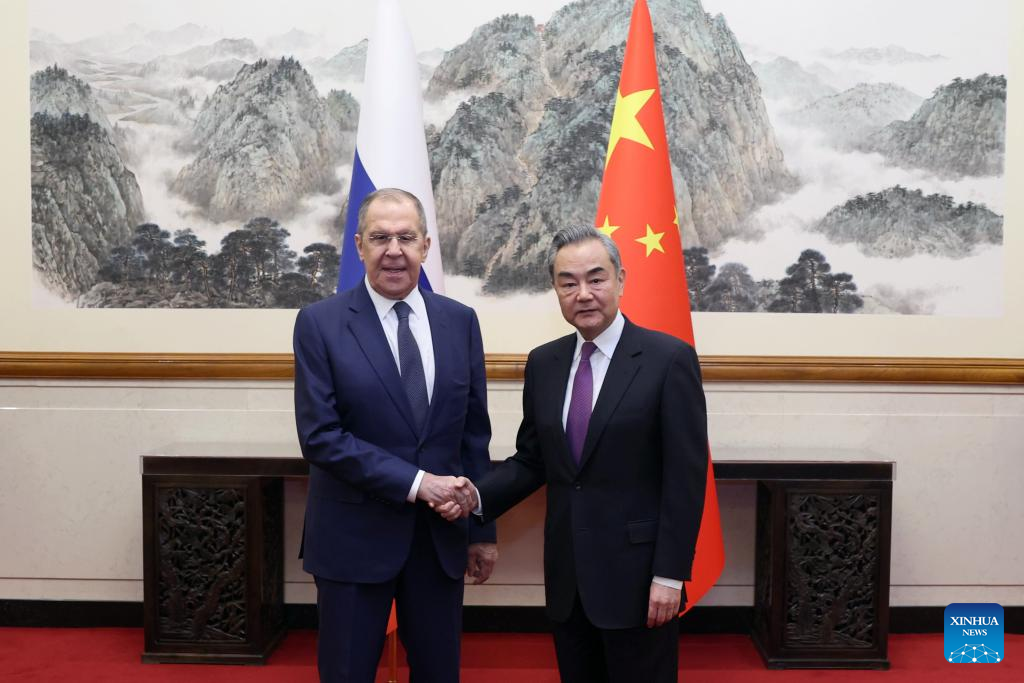
Chinese Foreign Minister Wang Yi, also a member of the Political Bureau of the Communist Party of China Central Committee, and Minister of Foreign Affairs of the Russian Federation Sergey Lavrov sign the plan on consultation between the two foreign ministries for 2024 after their talks in Beijing, capital of China, April 9, 2024. Wang held talks with Lavrov in Beijing on Tuesday. (Xinhua/Chen Bin)
BEIJING, April 9 (Xinhua) -- Chinese Foreign Minister Wang Yi held talks with Minister of Foreign Affairs of the Russian Federation Sergey Lavrov in Beijing Tuesday, and both sides expressed hope for strengthening practical cooperation in various fields.
Wang, also a member of the Political Bureau of the Communist Party of China Central Committee, extended congratulations to President Putin on his reelection. Wang said that China will continue to support Russia's development and revitalization under the leadership of President Putin and support the Russian people's independent choice of development path.
Wang said that the China-Russia relations have been of irreplaceable value to maintaining global strategic stability. Maintaining and developing sound China-Russia relations is the natural choice of the two major, neighboring countries and serves the fundamental interests of the two peoples.
Wang said China is willing to work with Russia, in accordance with the consensus reached by the two heads of state, to strengthen the synergy of the two countries' development plans and promote practical cooperation in various fields.
Lavrov noted that Russia-China relations are based on mutual respect, equal cooperation and trustworthy dialogue. Russia abides by the one-China principle and is willing to work with China to maintain close high-level exchanges, and deepen practical cooperation in economy, trade and other fields.
Russia supports the Global Security Initiative, and is willing to deepen cooperation with China on multilateral platforms to promote the establishment of a more just and democratic international order, Lavrov added.
The two sides also had in-depth exchanges of view on the Ukraine issue, the Palestinian-Israeli conflict, the situation in the Asia-Pacific region and other international and regional issues of common concern.
At a joint press briefing after the talks, Wang said that in order to further consolidate and develop bilateral relations, China and Russia should follow five principles:
The two countries should always follow the strategic guidance of head-of-state diplomacy.
The two countries should always adhere to the principle of no-alliance, no-confrontation and no-targeting at any third party.
The two countries should always stay on the right course on major matters of principle. As permanent members of the UN Security Council and major emerging countries, China and Russia actively respond to the common aspirations and legitimate concerns of the people of all countries, advocate a new path of state-to-state relations featuring dialogue and partnership rather than confrontation and alliance, and actively promote the building of a community with a shared future for humanity.
The two countries should always pursue win-win results through cooperation. China and Russia will continue to advocate inclusive economic globalization that benefits all, jointly oppose unilateralism and protectionism, and foster new drivers of global development and progress.
The two countries should always advocate an equal and orderly multipolar world. China and Russia support the central role of the United Nations in the global governance system, and will further strengthen international coordination.
During the press briefing, Wang elaborated on China's stance and proposition on resolving current international and regional hotspot issues.
According to him, principles to which China adheres for resolving hotspot issues are:
-- upholding the purposes and principles of the UN Charter, international law and basic norms governing international relations;
-- actively promoting parties concerned to resolve conflicts through dialogue and consultation;
-- properly accommodating the legitimate concerns of all parties and seeking sustainable solutions;
-- and upholding genuine multilateralism and opposing camp confrontation, especially in the Asia-Pacific region.
Wang said that on the issue of Ukraine, China calls for ceasefire as soon as possible, and supports the timely convening of an international conference recognized by Russia and Ukraine, with equal participation of all parties and fair discussion of all peace plans.
On the Palestinian-Israeli issue, Chine believes that the resolutions adopted by the UN Security Council are binding and should be effectively implemented to achieve an immediate, unconditional and lasting ceasefire, he added.
Wang also said that greater attention should be given to solving other global and regional hotspot issues, including the continued fight against terrorism.
The international community should firmly support the efforts of all parties to safeguard national security and stability and strengthen international counter-terrorism cooperation, he said. ■

Chinese Foreign Minister Wang Yi, also a member of the Political Bureau of the Communist Party of China Central Committee, and Minister of Foreign Affairs of the Russian Federation Sergey Lavrov attend a joint press briefing after their talks in Beijing, capital of China, April 9, 2024. Wang held talks with Lavrov in Beijing on Tuesday. (Xinhua/Chen Bin)

Chinese Foreign Minister Wang Yi, also a member of the Political Bureau of the Communist Party of China Central Committee, holds talks with Minister of Foreign Affairs of the Russian Federation Sergey Lavrov in Beijing, capital of China, April 9, 2024. (Xinhua/Chen Bin)



